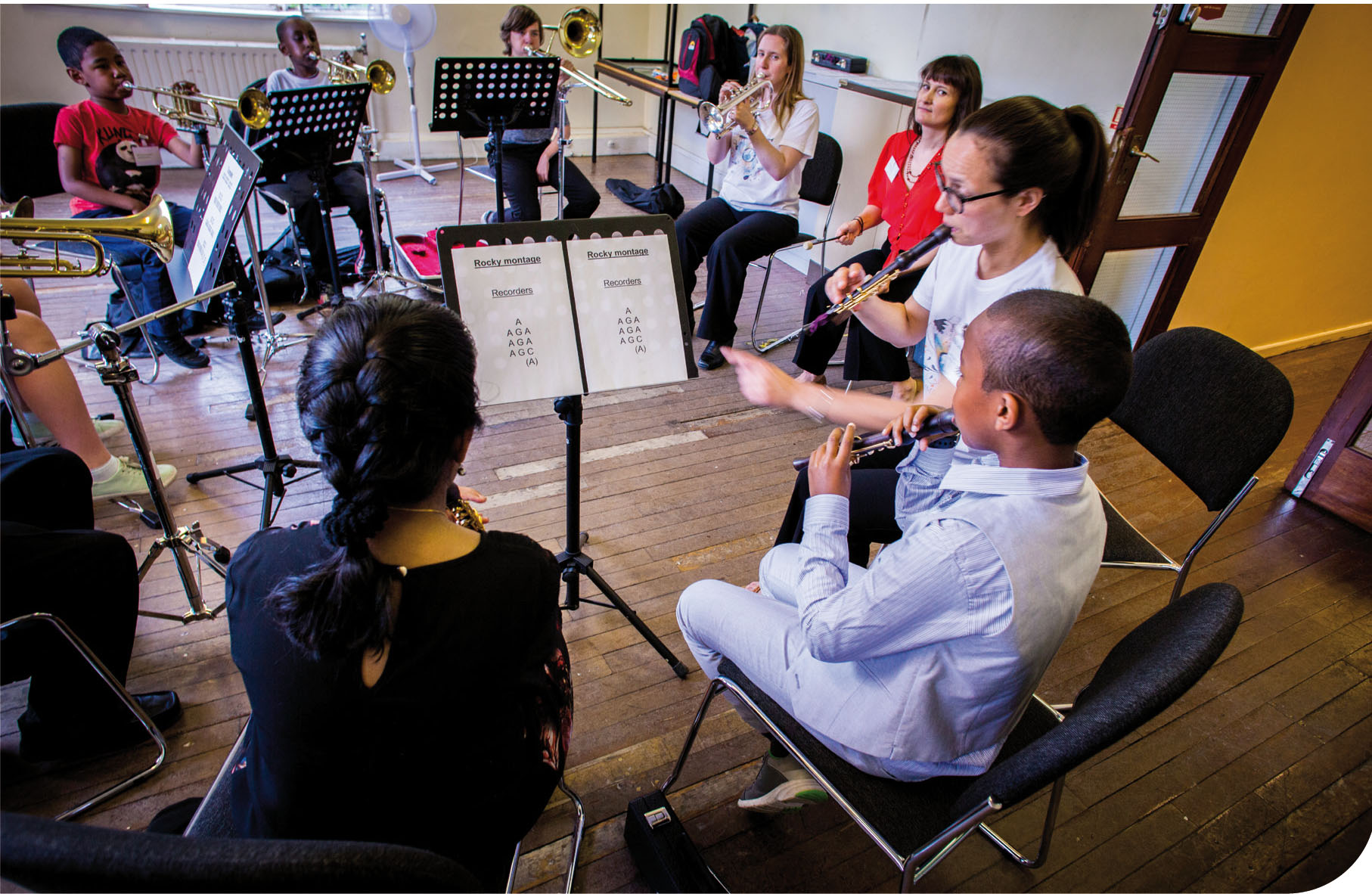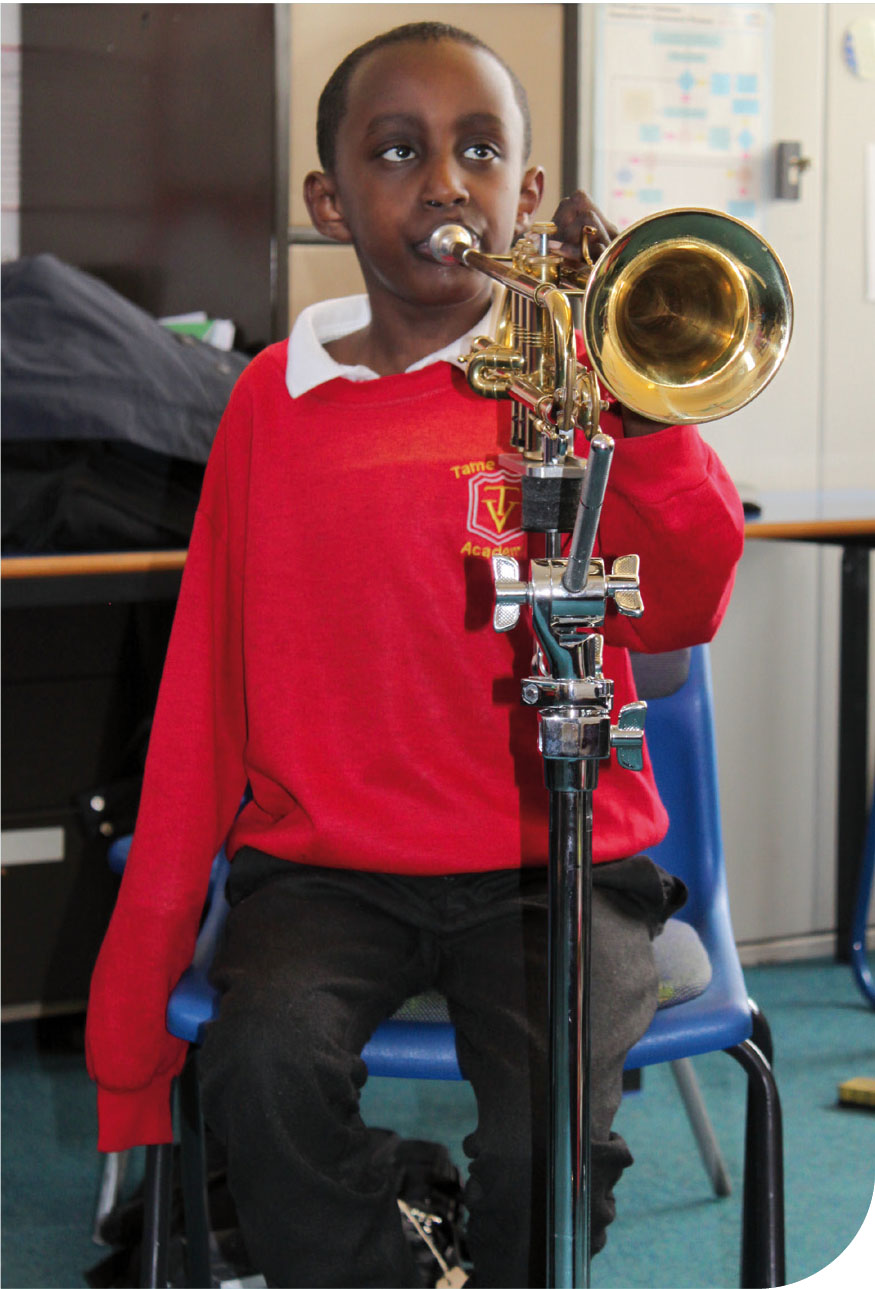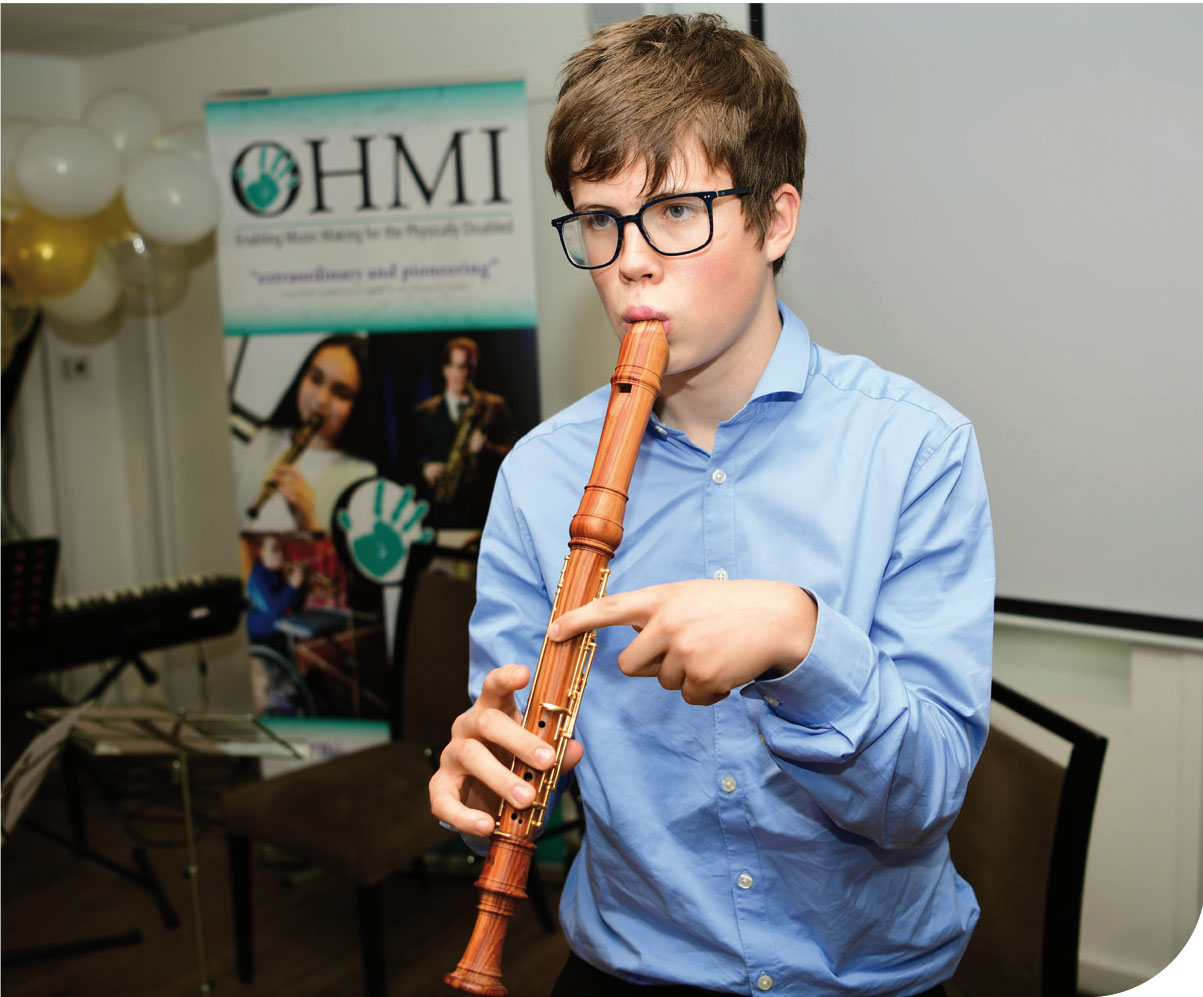
Our desire for music is profound. Wherever there is human life there is music; it is the expressive, supportive soundtrack to our lives, integral to everything we do. To deny participation to anyone is to deny them a human need and right.’ These are the words of Dr Stephen Hetherington, founder and chairman of the OHMI Trust – a charity that aims to enable children and adults with physical impairments to play the instruments they want to play, when they want to play them, and where they want to play them.
Although it may seem an obvious point for some, all instruments in a traditional orchestra need ten highly dexterous fingers to play them. This means that people with congenital disabilities, amputees, those with arthritis or who have had a stroke, and those who lack the full strength and control of their upper limbs, are unable to use traditional instruments in a sustainable way. This is a huge but largely unspoken about issue that is difficult to solve without proper investment and investigation.
The problem is at a pinch point when it comes to music education, as whole class instrumental teaching can often exclude children who are physically unable to play the planned instrument for that term. You don't need to look far to understand the scale of the issue – the Department for Education (DfE) published the statistic that in 2019 there were 31,459 children with a physical disability in mainstream schools in England. Most music teachers probably wouldn't know that sourcing an adapted instrument for a disabled student was an option, let alone how to go about obtaining one. That is where the OHMI Trust comes in.
The scope of the problem
Rachel Wolffsohn, general manager at the OHMI Trust, manages to squeeze me into her busy schedule; she tells me she has just come from a meeting about the possibility of 3D printing a one-handed clarinet, with the ultimate aim of making the instrument more accessible, especially for schools. Wolffsohn says that while the charity's acronym comes from the One-Handed Musical Instruments Trust, they dislike using the full title, as their focus isn't just on individuals with one hand, but also people with other physical disabilities. Instead, they call themselves the OHMI (oh-mee) Trust. The charity is celebrating its tenth anniversary this year, and while jubilations were plentiful, the small team have already set their eyes on the future and growing the charity's reach.
‘There are about 40-odd conditions that can affect hands,’ says Wolffsohn. Sometimes it's not obvious that a child would require an adapted instrument because, as Wolffsohn puts it, ‘if you walk into a room, you don't immediately spot them’. She continues: ‘In one term we had two cases (in separate hubs) where students were missing a thumb and were participating in whole class sessions on violin. Everything was fine with plucking, but as soon as the class got to Christmas and the bows were given out, the children with physical disabilities were excluded as they couldn't grip the bow.’

© THOMAS GREADER
A group of OHMI Music-Makers with Services for Education teachers
A significant number of children are affected by similar problems, including those with conditions like cerebral palsy, or those who have a slight facial weakness that prevents them from being able to blow into a trumpet. While a student may be able to hold an instrument with both hands and seem capable of learning with the rest of the class, they may struggle if the dominant hand isn't holding the instrument when playing.
Solutions
Wolffsohn acknowledges that if a child has a burning desire to play the violin and someone gives them a trumpet, they are unlikely to be as interested. If a student has a strong left hand and they are interested in brass, they are often told to play the French horn as it is the only left-handed brass instrument, Wolffsohn tells me. ‘You might be the best French horn player – and that is brilliant – but it shouldn't be because that is the only instrument someone can think of for you to play.’ OHMI is trying to provide as many solutions as possible, so that all students have the option to follow the musical path they choose.
‘We are really trying to raise awareness of the more common conditions that need acknowledgement in schools up and down the country, and the impact this can have when it comes to music lessons.’ Wolffsohn says as she pulls a one-handed recorder into view. This is one of the solutions OHMI has produced for whole class recorder lessons. The instrument is beautiful – a rosewood body with gold-plated keys – and was designed and built by renowned instrument maker Peter Worrell in Norfolk. The adapted recorder won OHMI's biennial competition in 2012, which has since been redesigned by Worrell to work as a plastic instrument, halving its price tag.
OHMI has also been working with Birmingham City University's jewellery school to find a solution for a 3D printed version of the one-handed recorder – something that exists (and could work with a few tweaks) but costs parents £100 per recorder. Wolffsohn points out that although this is still 10 times more than an average recorder would cost, it does show the progression that OHMI can make towards supplying both entry-level and high-end instruments for those with physical impairments.
 An OHMI Music-Maker using a left-handed instrument and floor stand
An OHMI Music-Maker using a left-handed instrument and floor stand
Changing musical trajectories
There are several charities and groups creating new instruments, but OHMI has refined its focus to adapting existing instruments for a traditional ensemble. The charity strives to find solutions to make these instruments accessible, and the team has plenty of success stories. For one student, who was physically unable to cover the holes of a clarinet without assistance, OHMI was able to source a plateau-keyed instrument with an extension on one of the keys. Most recently, a 16-year-old musician achieved Grade 8 on a one-handed recorder and performed at the opening of OHMI's tenth anniversary concert and 2021 competition awards.
Maria, a primary school student with a physical disability affecting her left hand, represents one of these success stories. Her teacher, Clare, applied for a one-handed clarinet for her, aiming for it to arrive in time for Maria to join in with the whole class clarinet sessions the following year. Unfortunately, this was not the case. Logistical complications arose, as music hubs do not have easy access to adapted instruments, but OHMI helped to fund-raise the money to purchase Maria's one-handed instrument instead.
Maria now plays with a couple of small ensembles, including a junior wind band, and has made some new friends in the process. ‘I feel quite proud when I play the clarinet’, Maria says with a smile. ‘I want to be in a big orchestra, so I am working towards that’. She has even attended a ‘Sparks' day at the Royal College of Music.
 Sixteen-year-old Benedict performing at OHMI's 2021 Awards ceremony using a one-handed treble recorder
Sixteen-year-old Benedict performing at OHMI's 2021 Awards ceremony using a one-handed treble recorder
Equal opportunities for all
‘I am almost lost for words over how amazing OHMI is as a charity. Having access to a one-handed instrument has opened doors for Maria that we never thought would be possible, and the support we have had from OHMI, and Rachel, has been just brilliant,’ says Clare.
When working with another promising charity, Reach, to initially find Maria an adapted recorder, Clare heard stories of children being taken out of whole-class music lessons or being told to drum in the corner instead. ‘That isn't the answer – with a bit of planning we can change that!’ Clare says. Choosing a different instrument for the whole class to suit what adapted instrument is available is one option, or applying for a one-handed version of the initial instrument well in advance (Clare suggests a year ahead) is another way to ensure there is no exclusion in your classroom; you can do so by contacting OHMI.
Additional needs may not always be visible, and they may not always be registered on a school's SEN register as, in cases like Maria's, these types of disabilities may not affect a student's learning in any other way. Clare reminds me that while music teachers may not have found a student with a physical disability in their class yet, they may have one next term. ‘We shouldn't be asking about what a student can't do, or what they are going to do instead. We should be asking what we as teachers need to do in order for the student to play the instrument they wish.’
OHMI has a brilliant and informative website, and the charity is currently working on teacher training in conjunction with Birmingham City University that will launch in the next year or two to increase awareness and understanding in schools. While OHMI's mission to ensure equal opportunities for all children is admirable, it is a small charity tackling a big issue. Raising awareness in your music classroom, and ensuring inclusivity for all students, will help adapted instruments to be more commonplace in schools across the country.








